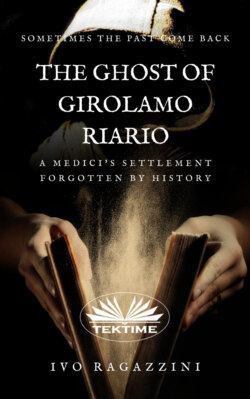Читать книгу The Ghost Of Girolamo Riario - Ivo Ragazzini - Страница 5
Introduction
ОглавлениеAt the end of August 2010 a person, while under the town hall of Forlì, saw the shadow of a figure dancing on the external walls near a window on the first floor of that building.
Since it was evening, but it was still sunny, he believed it was a reflection on the glass and did not give it much importance.
But a few days later he saw that shadow moan with a deep cut in the head go out of a room in the city hall and run away into the corridor.
Later someone else told not only that he had seen the same shadow but also had heard it speak.
The testimonies said they saw a man with a part of his head split or missing telling and complaining about wanting to defend his lady in danger and asking for revenge against someone who had betrayed him.
Some details of these sightings were then told on January 31, 2011, on the front page in the local chronicles of Forlì and, to tell the truth, there were other people who trusted to have seen him even if they wanted to remain anonymous.
At a first glance some thought that it was Jacopo Feo, the second husband of Caterina Sforza, but according to the author, it was an old story forgotten by everyone's memory which dated back to 1488, when Riario was assassinated in the palace town of Forlì by three men who stabbed him on the first floor and then threw him in the square below, a story that many historians seem to have forgotten or put aside for some reason.
But what is known about Riario today?
Shortly. Currently it is known that an alleged image of him has remained, or rather has been saved in the Vatican, due to the fact that it was portrayed alongside his uncle, Pope Sixtus IV, by the painter from Forlì, Melozzo degli Ambrogi.
And even in Forlì, where he governed and was assassinated, almost nothing remains of him and although at the time he was the general commander of the pontifical army, very few still know today who was really this man, why he was assassinated and who were the real instigators.
Furthermore, as you will see later, many characters and details of this story were forgotten and buried under a kind of damnatio memoriae1, that is condemned to be forgotten by people's and historical memory.
But memories cannot be completely erased and, as soon as you look at them well, they somehow seem to resurface and reaffirm their presence as if they were protesting that they had been put aside for too long.
And one could speculate that such a hunger for historical memory could create forgotten things that persist and resurface over time which can also be called ghosts of the past if you prefer.
Written quickly and fluently, halfway between essay and narration, this historical tale perhaps reveals for the first time in a frank and direct way many unthinkable facts, places and background, which happened to a person called Girolamo Riario, first husband of Caterina Sforza and nephew of Pope Sixtus IV, assassinated over 500 years ago by a conspiracy in the town hall of Forlì.
It also explains events never observed or completely forgotten for a long time which hardly anyone remembered anymore.
Here is a list of some things you will discover in this book.
Was a book of prophecy written that announced Riario's death?
Who Wrote It? On whose behalf?
Why did the ghost have his head split?
Who were the real instigators of the killers of Riario?
What had Riario done to end up murdered?
Did Lorenzo the Magnificent and his brother Giuliano de 'Medici, murdered ten years earlier in Florence, have anything to do with this story?
Was a company of hired assassins created to assassinate him? From who?
Why did Riario enter in church only surrounded by several guards?
What the killers of Riario do after killing him?
Is a true or a false story that Caterina Sforza would show her sex shameless from the stands of the fortress of Forlì, when her enemies asked him to surrender? What did she do instead?
And much more that you will discover and understand for yourself while reading.
So I wish you a good read and a good rediscovery of this completely forgotten historical event.
And, if after reading this book, someone accidentally encounters the ghost again, I'm sure he will understand it much better than before.
